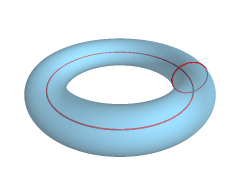|
(2015
midterm assignment) Model Student Midterm answers 2015 (Index) Essay 2: Personal / professional topic |
 |
Oh.
Zee. (Ozzy Martinez)
6/30/20XX
The Subliminal Line
I
think I would agree with Kevin Kaup’s perspective, “Ironically, the idea of an
apocalypse can validate one's existence, and give perspective to a life that
appears as no more than a blip on the radar of human existence and experience.”
I would agree that death is a grand part of why life has any worth, and that
it’s all about the tightrope walk between immortality and oblivion. I think the
point of futuristic literature is to find for humanity a suitable end, one
worthy of its current existence. When considering
Revelations and
Sower, the relative ends of humanity
don’t paint them a great picture. From a personal and professional perspective,
I want to paint humanity a good picture, and give it a worthy demise (so to
speak).
The apocalyptic transgressions of an era can also give light to its
strengths. Like “Mozart in Mirrorshades,”
time travel is used (presented to be used) for merely capitalistic
tendencies, but survivalist as well. The scope of our technology to trivially
burst through time and cause splintering near apocalyptic scenarios and duck out
when convenient shows the strength of a civilization that can treat itself so
casually. It also shows the brutality inherent when technology can sever us from
ourselves. The media can argue that the rise of digital means of communication
has desensitized us to heartfelt conversations and social conventions, and so
time travel has caused the future to pillage its own origins without respect to
them.
What I’ve taken from this is the more abstract way of thinking in the
sublime. My personal understanding of the sublime is the presence of an
overwhelming power and the absence of its use, or rather the observation without
direct action; the sublime is synonymous with restraint. With “Mozart”,
we see a glimpse of an ultimately dominating unfeeling culture that has its
own origins as a plaything, moving history around like vinyl miniatures.
“Gernsback Continuum” brings forth
the idea of alternative futures overlapping our own, coexisting in spatial and
temporal terms and yet distanced by a “membrane of probability.” Man no longer
the domineering child but an apathetic cosmos with the potential to bend and
blend the forking paths of life betwixt and enjoy the fallout.
Personally I hope to understand a unified approach for humanities
limitless potentials that encapsulate both the alternative and branching
parallel realities, one that shares the sublime of both “Gernsback” but also
Arthur C. Clark’s Childhood’s End,
the novel I will be sharing for my future vision. In essence, the sublime aspect
of humanity having it’s crisis solved (in a way the
Time Machine only hinted at) but the
realities of a universe where humans have that absolute command for their
surroundings. Childhood uses the
concept with a power from without,
but still manages that central question of an omnipotent guardian overlord and
the proper use of power, in effect, the restraint of its power. It is in this
regard I hope to use the material of the semester to solve this fundamental
problem, and have taken from it an optimism.
Despite the messy origins of our creation, culture, and knowledge, the
materials thus far have shown us our ability to adapt and mutate the stories of
old and cleave of them the lessons from the baggage. As a society we’re
cultivating a heightened metareceptor (in a sense) that allows us to see past
the literary brunt and extract from it an authorial intent. And I can’t get
further than that; if I have a professional purpose it’s to understand that, to
build off these branching various methods of reality and deconstruct one from
the others. From the linear aspects of the bible to evolutionary, cyclical,
alternating, parallel, and the complicating societies that bred them, what then
comes from our digital era of simultaneity, of big data and the destruction of
life’s ephemeral nature, now broadcast unto the universe and existing
(potentially) forever. But these are topics yet to be discussed in our class
that I’ll hope to touch on later.
 |
 |
 |
